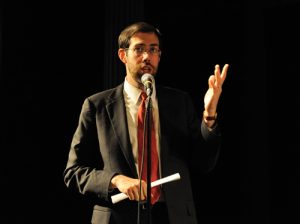
BY TERESE LOEB KREUZER | In an op-ed in the Daily News on Sunday, Feb. 19, New York State Senator Daniel Squadron proposed a game-changing plan for the Battery Park City Authority.
Battery Park City is now 40 years old, observed Squadron, and has matured from empty landfill in the Hudson River to a community with thousands of residents, workers and visitors.
“It is time to reform how Battery Park City is run,” said Squadron. “New York City holds an option to disband the Battery Park City Authority [a public benefit authority controlled by the governor] — but an attempt to simply fold it into the city’s general operations would not fly with a community that pays significantly more for services than the average New Yorker. Still, the city’s option does present an opportunity to increase local representation and ensure greater reinvestment locally.”
Squadron would like to replace the existing Battery Park City Authority Board of Directors with a new board comprised of residents and to use funds in excess of those needed for the maintenance of Battery Park City to pay for affordable housing, parks and green spaces in Lower Manhattan.
Battery Park City was originally conceived as a planned community owned by the State of New York, with a mix of residences, offices, shops and parks. Revenues from ground rents (the land on which Battery Park City’s buildings stand), PILOT fees (Payment in Lieu of Taxes) and other fees were to be used in part to subsidize affordable housing elsewhere in the city. However, Squadron wrote, “Today’s process for spending surplus dollars has more to do with horse-trading than principle. Just a couple of years ago, $200 million of these surplus dollars were swept away in one shot to close the state budget gap.”
“Affordable housing was the founding principle of Battery Park City,” Squadron said in a telephone interview the day after his article appeared. “It is one that has not been fully realized by any stretch but that’s not inconsistent with local priorities. We need affordable housing locally and we have open spaces that are in crisis when it comes to funding — from Hudson River Park all the way down to the East River. Those two priorities are what surplus dollars from Battery Park City should be used for. They benefit Battery Park City and they meet the broader goal that it was founded on.”
He said that Hudson River Park is in urgent need of funds both for operating expenses and capital expenditures and that the Battery Park City Parks Conservancy, which maintains Battery Park City’s 33 acres of parks and gardens and organizes programming throughout the year, has “very, very high costs.” He went on to say that, “We know that along the East River we have some wonderful, new open spaces without any funding mechanism.”
Squadron’s Daily News piece was the first public statement of his idea for reform. He said that the reaction has been positive.
“I think that people think there’s real promise here,” he said. “The devil is often in the details so the conversation needs to continue – but when it comes to assured local representation, when it comes to affordable housing – across the board people in Battery Park City and in Lower Manhattan know we need a change.”
At the present time, the Battery Park City Authority Board of Directors has just one local resident — Robert Mueller, director of Urstadt Biddle Properties. He was appointed to the board in June 2006. Recently, Gov. Andrew Cuomo appointed a second Battery Park City resident to the board, Martha Gallo, the general auditor for JP Morgan Chase, but her appointment has to be approved by the New York State Senate.
Squadron said that he appreciated the governor’s appointment of Gallo to the board, but “we can’t pray for good news floating down the river from Albany. We should have a structure that ensures sufficient local representation.”
Squadron’s plan for Battery Park City could be implemented quickly. New York City has an option to take over Battery Park City, he explained. “If that were done without the protections I talk about, I think we would all have to oppose it,” he said. “But if the City were willing to commit to the things we’re talking about in a binding obligation, that’s all it would take. The [B.P.C.A.’s] debt would move to the City in that case, and there are questions about how that would work, but we believe the City would have the capacity to assume that debt.”
Squadron praised the Battery Park City Authority’s chairman, William C. Thompson, Jr. and the Authority’s president, Gayle Horwitz for having done “a commendable job.” But he went on to say, “This is not about the current administration in Battery Park City. It’s about a structure that makes more sense for the community over time.”
He regards his proposal as a starting point for further discussion. “I’m sure there are ways to improve on what I’ve thrown out there,” he said. “I would love feedback from the community about this idea and a way to work with my colleagues, with the City, to move forward. There’s a lot that should be preserved about the current structure, but I hope that there’s openness to improvements on it.”


































